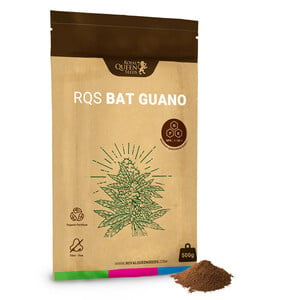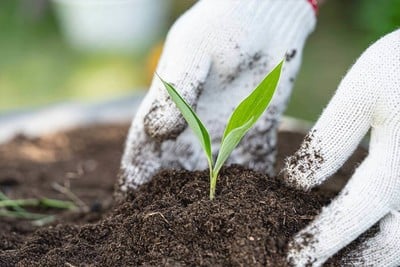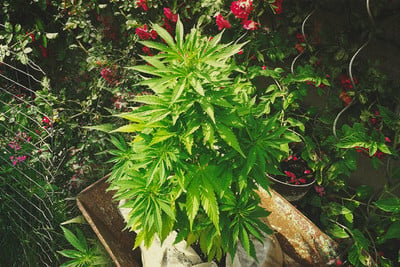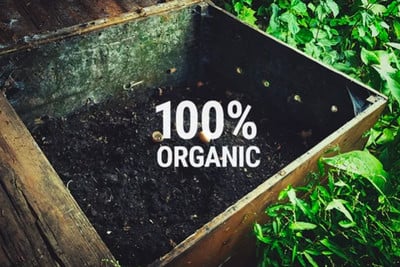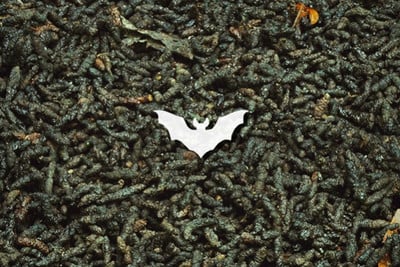.

Organic Super Soil Amendments | Definitive Guide To All-Natural Plant Food
The right organic soil amendments will breathe new life into tired super soil both during a grow and when you recycle your substrate. By replenishing nutrients when your plants need them most, you can ensure your organic grow results in a huge yield of crystal-coated buds with superior potency.
By design, organic super soil has everything your cannabis plant needs to thrive. However, even the best mix may need to be replenished or amended from time to time. This is especially true when you start off with a shop-bought mix, cultivate heavy-feeders, or reuse your soil.
Here's a list of organic soil amendments that will keep your plants happy and productive, as well as those to avoid:
ORGANIC SOIL AMENDMENTS TO USE
1. WORM CASTINGS
With minimal effort and expense, a worm farm can provide an unlimited source of worm castings for your garden. You can also buy worm castings by the bag at most greenhouses and nurseries. Worm castings release nitrogen into the soil faster than virtually any other organic soil amendment. They also add healthy bacteria and a wide variety of micronutrients.
2. CRUSTACEAN MEAL
Made from ground-up shells from crabs, shrimp, and other sea creatures, crustacean meal is naturally high in nitrogen, calcium, phosphorus, and chitin. It's a slow-release amendment, and it has a bonus feature: The chitin supports microbes that kill harmful nematodes that would damage roots if not kept in check.
3. BAT GUANO
This natural amendment has more nitrogen and phosphorus than any other natural substance you can add to your soil. Bat guano will also add a diverse community of bacteria and microbes to your plant's root zone and support consistent plant growth.
|
ORGANIC SUPER SOIL (NUTRIENTS) | 1. WORM CASTINGS | 2. CRUSTA- CEAN MEAL | 3. BAT GUANO | |
|---|---|---|---|---|
| NITROGEN (N) | X | X | ||
| PHOSPHOROUS (P) | X | X | ||
| POTASSIUM (K) | X | |||
| MAGNESIUM (Mg) | X | X | ||
| CALCIUM (Ca) | X | |||
| BORON (B) |
4. BONE MEAL
This blend of ground beef bones is a great source of phosphorus, as long as you keep your pH level under 7. Outdoor cannabis farmers will need to fence off their plants if they use bone meal. Some animals are so attracted to bone meal's aroma that they'll dig up your garden to get at what their nose tells them is buried there.
| ORGANIC SUPER SOIL AMENDAMENTS (SPECIFIC NUTRIENTS) | ||||||||
|---|---|---|---|---|---|---|---|---|
| NITROGEN (N) | PHOSPHOROUS (P) | POTASSIUM (K) | MAGNESSIUM (Ma) | CALCIUM (Ca) | BORON (B) | |||
| 1. WORM CASTINGS | X | X | X | X | ||||
| 2. CRUSTACEAN MEAL | X | X | X | X | ||||
| 3. BAT GUANO | X | X | ||||||
| 4. BONE MEAL | X | X | ||||||
| 5. BLOOD MEAL | X | X | ||||||
| 6. CHICKEN MANURE | X | X | ||||||
| 7. ROCK DUST | X | |||||||
| 8. KELP MEAL | X | |||||||
| 9. COMPOST | X | X | X | X | ||||
| 11. WOOD ASH | X | X | ||||||
| 12. MYCORRHIZAL FUNGI | X | X | ||||||
| 14. GARDEN LIME | X | X | ||||||
| 15. EPSOM SALTS | X | |||||||
| 16. AZOMITE | X | X | X | |||||
| 17. GREENSAND | X | X | X | X | ||||
| 19. MULCH | X | X | X | X | ||||
5. BLOOD MEAL
Blood meal is similar to bone meal, except it's made from dried cattle blood. This amendment is very high in nitrogen and can burn your plants if you use too much. It will also lower the soil's pH level. Blood meal is thought to repel deer, squirrels, and moles, but it can attract dogs and other carnivores. Think carefully before you use it in an outdoor garden.
6. CHICKEN MANURE
Chicken manure is rich in nitrogen and phosphorus, but it's really strong. It's considered a "hot" fertiliser that can burn your plants if it hasn't been properly treated and allowed to mellow for a period of time. Use this soil amendment with caution. Rabbit manure is a good substitute if you own a bunny or know someone who does; it's plentiful, cleaner, and not nearly as hot.
| ORGANIC SUPER SOIL (NUTRIENTS) | 4. BONE MEAL | 5. BLOOD MEAL | 6. CHICKEN MANURE | |
|---|---|---|---|---|
| NITROGEN (N) | X | X | ||
| PHOSPHOROUS (P) | X | |||
| POTASSIUM (K) | X | X | ||
| MAGNESIUM (Mg) | ||||
| CALCIUM (Ca) | X | |||
| BORON (B) |
7. ROCK DUST
Rock dust is exactly what it sounds like: crushed rock. It's a slow-release source of phosphorus. If you recycle your soil, you'll only need to add it every couple of years. Rock dust requires a pH level of around 7 to work.
8. KELP MEAL
Made from dried seaweed, kelp meal adds potassium to the soil, as well as over 60 essential elements and minerals, to help support the microbes in your soil. It's thought to increase sweetness, boost flavour, and enhance colours—things that most cannabis growers desire.
9. COMPOST
Compost isn't exclusive to the realm of organic weed growers. All farmers love this "black gold". It's generally made by layering soil, leaves, and household food waste, so it's as good as what you put into it. If you're using it for potassium, make sure you include banana peels and fruit rinds. Eggshells add calcium, and all compost contains beneficial microbes. Always make sure the compost is fully broken down and decomposed before adding it to your plants; it should look like rich, black soil when it's ready to be used.
| ORGANIC SUPER SOIL (NUTRIENTS) | 7. ROCK DUST | 8. KELP MEAL | 9. COMPOST | |
|---|---|---|---|---|
| NITROGEN (N) | X | X | ||
| PHOSPHOROUS (P) | X | |||
| POTASSIUM (K) | ||||
| MAGNESIUM (Mg) | ||||
| CALCIUM (Ca) | ||||
| BORON (B) | X |
10. COMPOST TEA
If your plants look like they need a quick pick-me-up, try a compost tea. You can make this by aerating a mix of clean water and a small amount of compost. The air activates the microbes and causes them to multiply at a rapid rate. Within a few days, you'll have a nutrient-rich compost tea that you can use as a liquid soil amendment throughout your grow.
11. WOOD ASH
Wood ash is a great source of potassium and lime, as well as many trace elements that cannabis needs to thrive. However, you should use this soil amendment sparingly or combine it with compost. It's known to quickly raise the soil's pH level to the point where it could lock out other nutrients.
12. MYCORRHIZAL FUNGI
Without beneficial fungi, organically grown cannabis plants will struggle to thrive. These microorganisms create a bridge in the root zone that helps plants absorb nutrients and water. They also protect the roots from damage by shielding them from harmful microbes. To add mycorrhizae to your soil, use a tube of inoculant.
13. PERLITE AND VERMICULITE
Cannabis likes air in its root zone. That's why it's important not to overwater or let your plants sit in standing water. It's almost as bad to let the soil get too dry. Using perlite and/or vermiculite as soil amendments can help. Perlite is made from volcanic glass; it's white, hard, and porous. Vermiculite is made from mica; it's scaly, lamellar, and pale brown in colour. Both are very light in weight compared to their volume, and do a great job controlling moisture and aerating the soil. You can use one or both as a soil amendment.
14. GARDEN LIME
Also known as sweet lime or dolomite, garden lime is made from limestone. It contains a significant amount of calcium and magnesium. Although it actually raises pH, this type of lime is often used as a buffer to keep pH levels stable and prevent fluctuations. When liming your plants, always use dolomite lime and not agricultural or hydrated lime.
| ORGANIC SUPER SOIL (NUTRIENTS) | 11. WOOD ASH | 12. MYCOR- RHIZAL FUNGI | 14. GARDEN LIME | |
|---|---|---|---|---|
| NITROGEN (N) | X | |||
| PHOSPHOROUS (P) | X | |||
| POTASSIUM (K) | ||||
| MAGNESIUM (Mg) | ||||
| CALCIUM (Ca) | X | X | ||
| BORON (B) |
15. EPSOM SALTS
Magnesium sulfate, commonly known as Epsom salts, is a natural source of magnesium and sulphur that plants can readily use. Always use pure magnesium sulfate purchased from a pharmacy, and not a bath product that's had oils or scent added to it. You can amend your soil by adding the crystals when you water your plants or by mixing them into a foliar spray.
16. AZOMITE
Derived from volcanic material, Azomite replenishes the soil with more than 60 water-soluble trace minerals. Those are the kind that can get washed away when you water your plants. This amendment can raise pH level, so it's another one to use sparingly.
17. GREENSAND
Greensand looks like it sounds: like greenish sand. Its chemical name is glauconite, and it's a rich source of potassium. It also contains calcium, magnesium, iron, phosphorous, and 30 or so trace minerals that help plants grow. Greensand also improves the quality of the soil to better control moisture levels. In sandy soil, it decreases the drainage rate. In clay soils, it does the opposite, loosening the soil so it drains faster. Greensand is slow to break down and release its nutrient content, so you only have to add it to soil every few years.
| ORGANIC SUPER SOIL (NUTRIENTS) | 15. EPSOM SALTS | 16. AZOMITE | 17. GREEN- SAND | |
|---|---|---|---|---|
| NITROGEN (N) | X | |||
| PHOSPHOROUS (P) | X | |||
| POTASSIUM (K) | X | X | ||
| MAGNESIUM (Mg) | X | |||
| CALCIUM (Ca) | ||||
| BORON (B) |
18. HUMIC ACID AND FULVIC ACID
Use these two soil amendments together for best results. Humic acid helps the roots absorb nutrients more effectively, while fulvic acid makes the nutrients more bioavailable to the individual plant cells. Together, these two acids help the plant make the most of the available nutrients while minimising deficiencies.
19. MULCH
Mulch serves two purposes; it helps your soil retain moisture, and microbes like to eat it. Don't mix this into your soil. Add a few centimetres of straw, compost, or wood chips over the surface of the soil. Replenish it monthly. Compost doubles as a top dressing and will gradually release nutrients as you water your plants.
| ORGANIC SUPER SOIL (NUTRIENTS) | 19. MULCH | |
|---|---|---|
| NITROGEN (N) | X | |
| PHOSPHOROUS (P) | X | |
| POTASSIUM (K) | X | |
| MAGNESIUM (Mg) | ||
| CALCIUM (Ca) | X | |
| BORON (B) |
SOIL AMENDMENTS TO AVOID
-
UREA
Urea is a component in urine; it's what the kidneys make when they remove nitrogen from the body. You can also buy pure urea. It's a cheap source of nitrogen, but not a great choice if you're growing cannabis. Urea changes quickly to ammonium, which transforms the nitrogen your plants can use into toxic nitrites that plants don't use or need. Next, the ammonium will turn into ammonia, which will evaporate and release a nasty smell.
-
SAWDUST
Sawdust contains nitrogen, but it contains even more carbon (50x more). This combination will lock out all nitrogen and starve your plants. You would have to allow the sawdust to age nearly 3 years to give the carbon enough time to decompose to the point it wouldn't cause nutrient lockout. Don't be tempted to mix sawdust into your soil to aerate it or increase its ability to hold moisture.
-
NON-COMPOSTED LEAVES
If you amend your soil with non-composted leaves, they'll become fodder for harmful bacteria as they decompose. As these bacteria proliferate, they will compete with your plants for nitrogen—and they usually win.
A FINAL WORD ON SOIL AMENDMENTS
By nurturing your organic substrate with the right soil amendments at the correct intervals, you can grow healthy, profit-yielding cannabis plants with big, resinous buds. When you enjoy the fruits of your labour, you'll also take comfort in knowing they weren't exposed to any harmful chemicals or toxic pesticides.
However, it can be easy to overdo it and burn your plants—even if your amendments are 100% natural and organic. Take it easy with richer add-ins until you see how your garden reacts. It's always easier to add than subtract from the soil. Soon, you'll be able to anticipate what your plants need, giving them exactly the right amendments at exactly the right time.


























